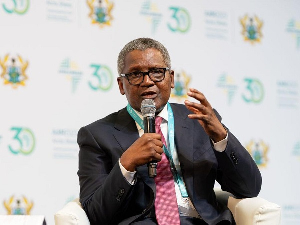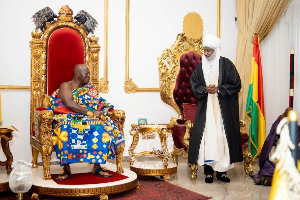As Ghana welcomes Israel and the Libyan National Transitional Council… (Part I)
By Dr. Michael J.K. Bokor
E-mail: mjbokor@yahoo.com
Saturday, September 10, 2011
In the past few days, the government made two important diplomatic moves that give glaring pointers to the direction in which it wants to move Ghana. After decades of being at odds with Israel, the government has decided to normalize relations and, consequently, restored diplomatic ties between Ghana and Israel. Then, the government announced that it has decided to give diplomatic recognition to the rebel National Transitional Council (NTC) as the legitimate governing body in Libya. These two moves in diplomacy have diverse far-reaching implications and deserve our attention.
RESTORING TIES WITH ISRAEL
There is nothing wrong with the government’s decision to restore diplomatic ties with Israel. In fact, it is long overdue. For taking this bold step, the government deserves commendation and must ensure that it does all it can to help both countries (especially Ghana) benefit from this bold decision. I wholeheartedly support this bold decision by the government for many reasons, the most admissible one of which is that the factors that motivated the severing of ties with Israel are no longer tenable in contemporary times and any insistence on treating Israel as an enemy is nothing but a clear instance of immaturity, shortsightedness, visionlessness, and laziness. We recall Ghana’s commitment to the Non-Aligned Movement (NAM) that dictated the country’s obedience to measures adopted by the NAM in the period of the Cold War to walk the middle of the lane even though in reality, most members of the NAM were sympathetic to the cause of the erstwhile USSR. Ghana also slavishly obeyed the dictates of the ex-Organization of African Unity (OAU) by joining other countries banded into the Non-Aligned Movement (NAM) and the Organization of African Unity (OAU) to sever diplomatic ties with Israel in protest against Israel’s aggression against the North African Arab countries, especially after the three-day war in 1967 that Israel won. This severing of diplomatic ties was in consonance with the political and ideological agenda of the NAM and OAU. But happenings in contemporary times have reduced that stance to absurdity. The NAM is no more relevant in international politics while the OAU shifted paradigmatically to bring in an African Union that is struggling to gain equilibrium let alone perform effectively to gain credibility, international recognition, and acceptance. Both the NAM and the AU can’t be validated by performance. Thus, any continued obedience to the sanctions they imposed on Israel is not only anachronistic but is also counter-productive. It deprives those member countries of the opportunity to benefit from the resources of the country with which they are at loggerheads. And Israel has a lot more to offer countries on good terms with it than those Arab countries have for Ghana particularly. A pertinent question arises. What did Ghana gain from severing diplomatic ties with Israel? Absolutely nothing, except being remembered for historical purposes only. Ironically too, while Ghana maintained no ties with Israel, it accommodated the Embassy of Palestine and those of the Arab countries whose fate prompted the severance of ties with Israel. But what can we say is the benefit that Palestine and those Arab countries have given Ghana for all this support? On a larger scale, was the Arab-Israeli crisis resolved as a result of the severing of ties with Israel? If not, what, then, can we say is the effect of the severance of diplomatic ties on that crisis? If the diplomatic action couldn’t solve the problem to date, what is the sense in keeping Israel out of Ghana’s life? My position is that Ghana lost much from this diplomatic anachronism and must, therefore, abandon it for the sake of benefiting from its stake in international diplomacy. Don’t accuse me of being myopic in suggesting selfishness in this case because there is nothing else to look for. In international politics and diplomacy, selfishness is the backbone; and countries seek to pursue agenda from which to benefit directly. Serving self- interest is the clarion call. Anything else is madness. That is why I insist that the days of futile, arid, and empty diplomacy based on a herd mentality or the blowing of a mere political hot air are over. Ghana stands to gain a lot from restoring relations with Israel more than standing away from it just because it wants to pursue a policy that was implemented in a period of headstrong but wrong-headed international politics. Perhaps, the only issue that may jolt anybody is the unexpectedness of the announcement. The decision to restore diplomatic ties with Israel came out of the blues, especially considering the fact that nothing in our internal politics or the global sphere gave any inkling to prepare our minds for this huge U-turn. Perhaps, the immediate rhetorical success lies in the suddenness of the announcement. That no one in government dropped any hint prior to the official announcement is a huge credit to a government that is reeling from the negative fallouts from the loose talk of its functionaries, which is evident in the 900 or so cables from the United States Embassy as released by the Wikileaks report in the past two weeks. No diplomatic ties but….. Hypocrisy abounds Ghana’s decision is not out-of-place. International diplomacy is a complicated game that manifests in several incredibly weird guises. We recall that the cutting off of ties with Israel meant that Israel had no diplomatic representation in those African countries and couldn’t do official business in those countries directly. Ironically, Israeli companies operated in those countries, including Ghana. The Motorola Company, for instance, did so. For the avoidance of any doubt, let me say here that although Ghana overtly was at odds with Israel, it didn’t mean that nothing changed hands between both countries—even if without official government involvement. The connection is simple. Once Ghana maintained cordial ties with countries that have since 1948 been bed-fellows of Israel (the United States, Britain, France, Italy, Japan, for instance), there is the certainty that Israel’s interests were catered for through those friendly countries. Under the auspices of these countries, for instance, Israel could get all the benefits it needed, operating under what is known in intelligence circles as “the alien flag.” Thus, the mere fact that Ghana was not on good terms with Israel shouldn’t deceive us into thinking that nothing at all transpired to involve both countries. In one way or the other, Ghanaian institutions profited from contacts with Israel. For instance, some personnel in important institutions were sent to Israel for further professional training and companies with roots in Israel did business with Ghanaian companies. Contacts were exploited for security benefits too. Under Kufuor’s rule, Francis Poku sent some military intelligence officers to Israel, one of such cases sparked off the trouble between him and Kufuor, leading to his dismissal. Other instances make nonsense of the hypocrisy underlying the claim that Ghana was officially not on diplomatic terms with Israel. Much water was passing under the bridge all that while that the country was deemed to be official out of touch with Israel. So, why continue to deceive the whole world that Ghana had severed ties with Israel when, indeed, there was some form of covert collaboration for mutual benefits? Why not step out boldly into the open to restore ties and regularize the country’s dealings with Israel—and shame the devil of empty political rhetoric?
Continued in the next installment…














